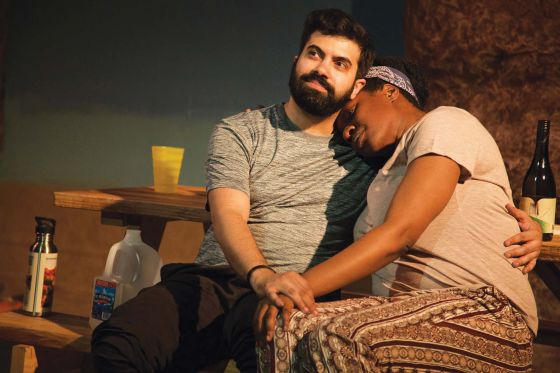
The Mojave Desert, located in the southeast corner of California, encloses within its boundaries the lowest elevations and highest heat indices in North America. These conditions endow the landscape with preservative qualities rendering it a site of natural phenomena dating to prehistoric times. Among these are the Joshua Trees, wind-twisted xerophytic shrubs deriving their label from the sun-dazzled hallucinations of evangelical migrants, for whom the eerie cactus shapes resembled prophets beckoning them to the promised land. Our view of this region, however, is of a campsite in the national park housing the aforementioned floral species, on a late summer afternoon with the temperature a moderate 105 degrees, where Arjun and Melissa are busying themselves building a picnic fire and erecting a fiberglass-and-nylon tent. They have embarked on this unseasonable wilderness retreat in an attempt to flee the pressures of their social media-fueled responsibilities—an exile already initiated by internet journalist-turned-aspiring novelist Mel, while USC American/ethnicity studies professor Arjun is on temporary suspension after perpetrating an injudicious tweet. Interrupting their two-person summit conference is Georgia, a volunteer ranger employed in recording the progress of climate change on the increasingly endangered environment. A dramatic universe featuring nature reflecting the fortunes of its hero(es) would ordinarily portend a romantic narrative, but playwright Sam Chanse's contrary approach to familiar archetypes in The Opportunities of Extinction leaves ambiguous the question of who will determines its outcome: Mel is five years older than her husband, but biological-clock expedience does not automatically incline her toward selfless motherhood over personal fulfillment. Neither does Georgia's youth guarantee optimism; it instead propels her to accept with stoical grace the end-of-days cosmology indicated by her findings. Despite the brief performance time (100 minutes), Chanse's analogies often exhibit the density of the LaBrea tar pits—let's not forget the extinction cycles, the incendiary hazards of invasive plants and the sloth trapped in a fumerole—but Aria Szalai-Raymond, Echaka Agba and, on opening night, understudy Vijay Sarathi parse their author's arguments with a delicate touch assuring our cognitive compliance, even during a dream sequence (whose?) involving guardianship of a baby (human, or botanical?) by self-absorbed citizens of poor parenting skills (meaning us). The technical team assembled for this Broken Nose world premiere production likewise keeps us grounded with its evocatively accurate representations of rain-shadow plains.
